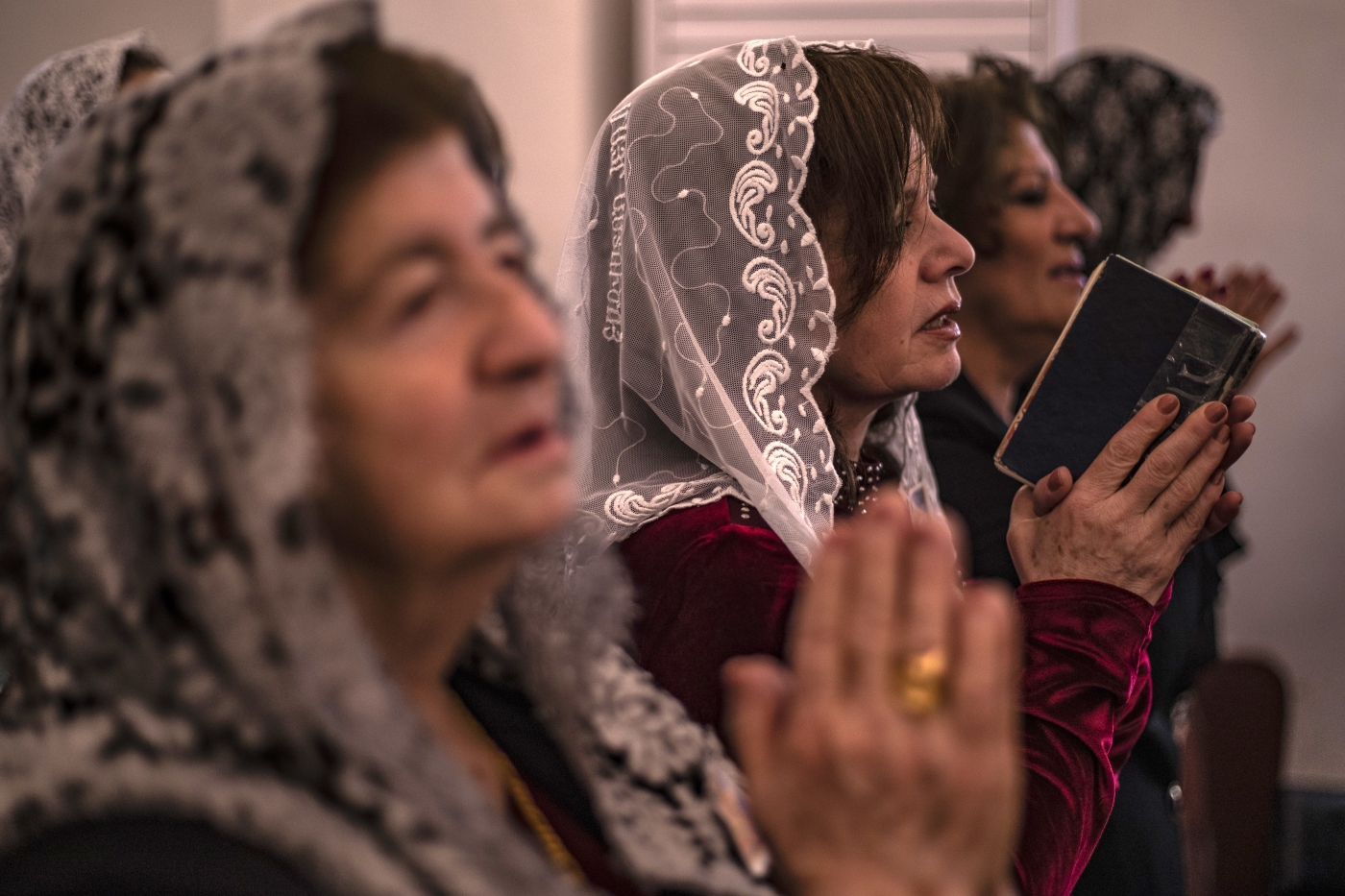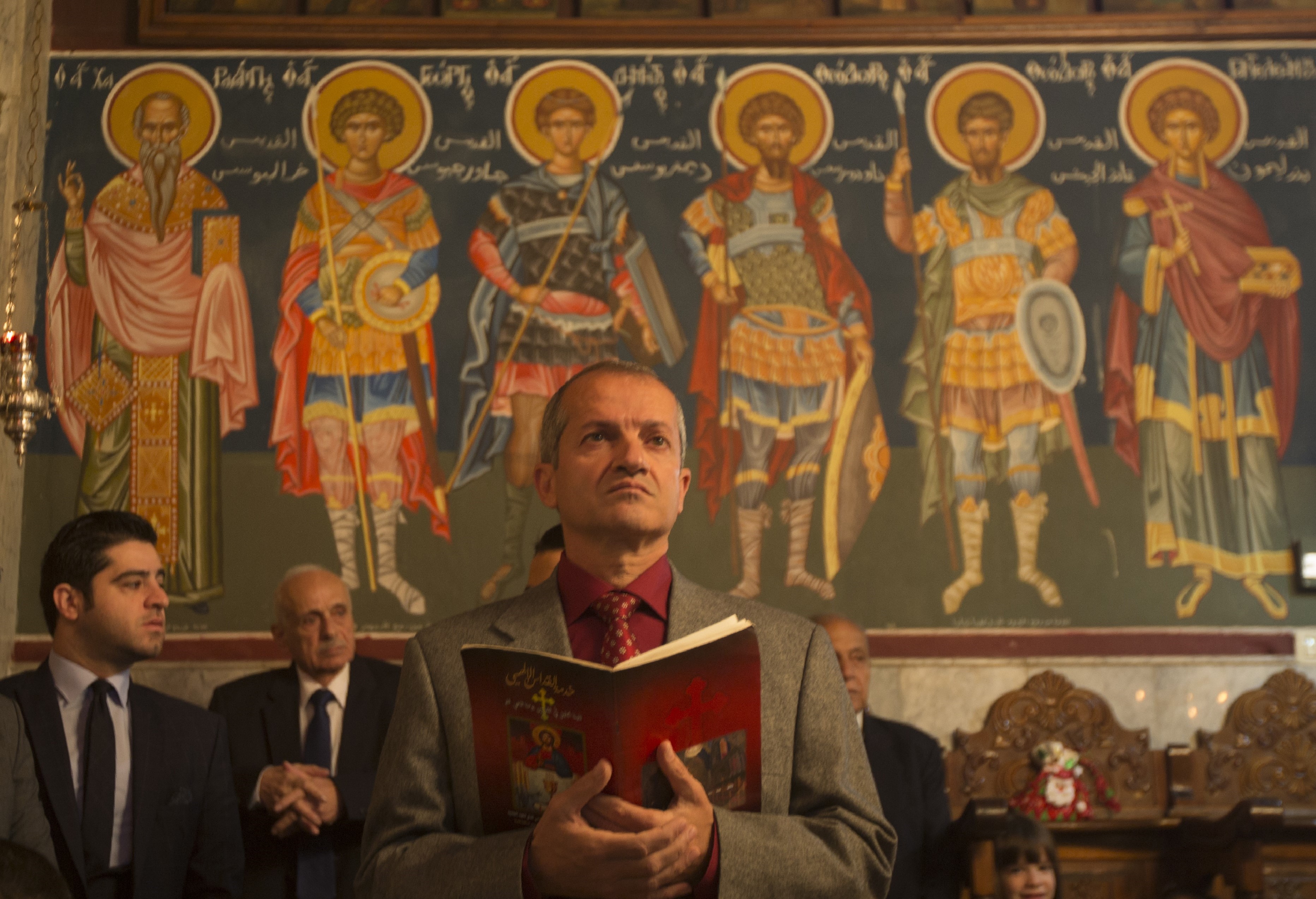The Bishop of Truro has not told the full truth about Christians in the Middle East
12 July 2019 13:13 UTC | Last update: 3 days ago
Any serious discussion of the current plight of Christians in the Middle East should place the behaviour of Western governments at the forefront of its analysis

Armenian Orthodox Christians attend the Easter mass at a church in the Kurdish-controlled city of Qamishli in northeastern Syria on 21 April 2019 (AFP)
The Bishop of Truro’s report on the persecution of Christians across the globe is well overdue and a gallant effort. The report, released this week, was commissioned by the British foreign secretary into Foreign Office support for persecuted Christians.
Christians suffer daily discrimination and worse. Secular Western governments have been reluctant to come to their aid. Yet, the report is a sad disappointment when it comes to the plight of Christians in the Middle East, where the religion originated. It is here that persecution, as the bishop correctly suggests, is at its most virulent.
Numbers are in rapid and probably irreversible decline. But the bishop’s analysis is weak. Blaming the exodus of Palestinians from the Holy Land on “tensions fuelled by the wider Arab-Israeli conflict” is a vague and unsatisfactory explanation.
The primary explanation
The report pays too little attention to the primary explanation for the persecution of so many Christians in the Middle East over the last two decades. This has to do mainly with Western foreign policy and particularly the 2003 invasion of Iraq.
The Middle Eastern section of the report comes over as an apology for Western foreign policy
In the report’s section on Iraq, we have to wait until the conclusion before any direct mention that the region is still suffering the effects of the “US-led military intervention”. This is not good enough. Any serious discussion of the current plight of Christians in the Middle East should place the behaviour of Western governments at the forefront of its analysis.
It’s not a surprise that the Bishop of Truro fails to do this. He acknowledges that several members of staff from the Foreign Office contributed to his project, but he also claims that his report is “independent”. Why, then, did he accept their help? When I put this point to the bishop, he insisted that they had made “no contribution at all to the text”.
Nevertheless, the Middle Eastern section of the report comes over as an apology for Western foreign policy.
Most striking of all is the report’s assessment of Syria, which has suffered a calamitous exodus of Christians since the start of the civil war in 2011. The bishop rightly blames persecution on sectarian groups, but he fails to confront the fact that the West and its allies have recklessly supported some of the very same armed gangs that have targeted Christians.

The Bishop of Truro assures me he spoke to the former Archbishop of Canterbury, George Carey, and the Christian campaigner Baroness Cox, both of whom are well informed. But he doesn’t seem to have learnt a great deal from them. At the very least, the report should have criticised the British Foreign Office for completely ignoring the interests of Christians in Syrian policy over the last eight years.
British foreign policy
To be fair to the bishop, he lacerates Foreign Office Minister of State, Baroness Anelay of St Johns, for suggesting in interviews with The Tablet and Christian Today that Islamic State has killed Christians not on the grounds of their religion, but because they supported the Assad regime. He also criticises the British government for the fact that less than 1 percent of Syrian refugees who come to Britain are Christian.
Blaming the exodus of Palestinians from the Holy Land on “tensions fuelled by the wider Arab-Israeli conflict” is a vague and unsatisfactory explanation
On the other hand, the report ignores the wretched refusal by the Foreign Office to offer visas to Syrian and Iraqi archbishops in 2016, presumably owing to alarm that they would speak out about the consequences of British government policy for Syrian and Iraqi Christians.
When I put this point to the bishop he reasonably responded: “The report makes frequent references to the shortcomings of UK asylum and visa practices affecting overseas Christians. We could not name every case.” Peter Ford, the former British ambassador to Syria, tells me the report is “a tawdry whitewashing of a disgraceful policy to ignore the consequences for Syrian Christians of our determination to oust Assad.”
Palestinian Christians' plight
The report fails to address the problems faced by Christians in the Occupied Palestinian Territories, an area that includes Bethlehem, the birthplace of Jesus Christ. I have been travelling the area over the last few weeks and have learnt from a number of Palestinian priests how their lives are being made, in some cases, miserable due to Israeli policy.
Foreign spouses of Palestinian pastors are finding it increasingly hard to obtain visas, meaning families come under pressure to split up. We have also seen the expropriation of church lands by settlers in murky circumstances, most notoriously buildings belonging to the Greek Orthodox Church at the Jaffa Gate of the Old City.
I asked the bishop why he failed to reference the Kairos Palestine document produced by local churches 10 years ago. The document was a serious attempt to grapple with the moral and practical problems facing Christian Palestinians today and highlighted the injustices of the occupation.
It is a very powerful document and should be part of any evaluation of the situation of Christians in the region. The bishop told me that “none of our witnesses from the Middle East (and there were many) made any reference to it.” I find this hard to understand because a number of leading Christians I have spoken to here in the last few weeks have told me about Kairos and its impending anniversary.
There is much that is good in the Bishop of Truro’s publication. He has made powerful statements about the predicament facing Christians across the globe. But he has not told the full truth about Christians in the Middle East and he has held back from making points which would embarrass the British Foreign Office.
The views expressed in this article belong to the author and do not necessarily reflect the editorial policy of Middle East Eye.


0 Comments:
Post a Comment
Subscribe to Post Comments [Atom]
<< Home